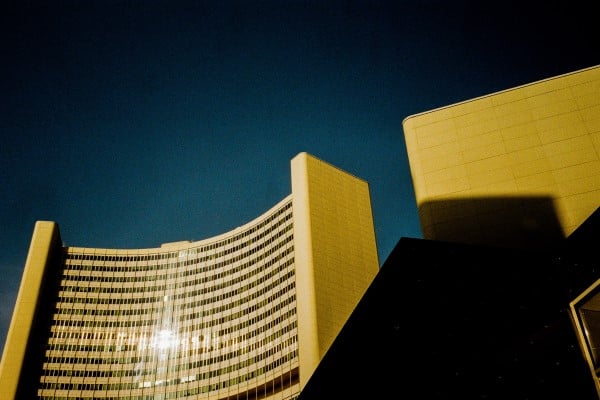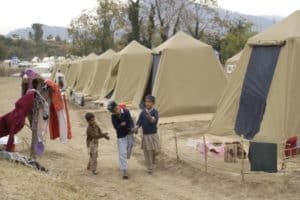This page contains affiliate links. This means if you a follow a link and make a purchase, at no additional cost to you, Humanitarian Careers will receive a commission. Thank you for supporting the site.
The United Nations was formed after World War Two with the intention to create a global forum where countries resolve their disputes without conflict. It is one of the most influential and important international organisations in the world.
However, the UN is often criticised for being ineffective and unable to resolve many major world issues. There are even some who think the world would be better without the UN…
So, what would a world without the United Nations look like? How would it be different, and what would happen if the UN never even existed? Read on!
More War
Many people think that if the United Nations didn’t exist, nothing would really change. However, it very clear there would be an increase in conflicts around the world if there wasn’t the UN.
Firstly, the United Nations plays an active role in peacekeeping around the world. It currently has twelve active peacekeeping missions and has successful completed many more. If the UN didn’t exist it would mean regional organizations or individual nations would need to intervene to guard the peace in many places. It’s been shown throughout history that many countries are unwilling to go it alone to intervene in conflicts, especially ones in areas they have no strategic interests.
Secondly, the UN plays a key role in mediating between countries in order to avoid conflict. Although these efforts are not always successful, it is highly likely that if the UN didn’t exist, there would be no independent body to arbitrate between conflicting countries.
The current United Nations is often criticized for being unable to stop wars. However, if it didn’t exist, it’s obvious that more conflicts would occur.
Reduced Global Focus on Human Rights
One of the main roles of the United Nations is the promotion of human rights around the world. If there wasn’t the UN, it’s probable that this global focus on universal human rights would not emerge.
Following World War Two, ideas such as human rights became mainstream, and the UN was partly created to be a leading international organization ensuring countries abide by human rights law.
Obviously, the UN has not been entirely successful in having human rights universally adopted – there are many countries with the world with poor human rights records. However, recording human rights abuses, publicizing crimes by abusive regime and bringing evidence for crimes against humanity are all key roles of the United Nations.
If the UN didn’t exist, the idea of human rights for all would likely have remained a Western idea. As we said, not all countries promote human rights… but all countries know they should. If there wasn’t the United Nations, surely the state of global human rights would only be worse?
Less Humanitarian and Development Aid
The UN is one of the largest organisations in the world delivering humanitarian aid to people affected by crises and disasters, as well as development aid to help lift people out of poverty. If it didn’t exist, this work simply wouldn’t happen.
UN agencies such as UNHCR, WFP, IOM and UNICEF are some of the most important humanitarian actors in the world. They help millions of people a year affected by crises such as conflicts, earthquakes, forced migration, floods, famines and extreme weather. If there wasn’t the United Nations, helping these people would entirely rely on individual nation states.
The United Nations also plays a key part in fighting poverty and helping poorer nations develop. If the UN didn’t exist, it would mean low- and middle-income countries either would not receive this support, or it would also fall to individual friendly nations to help. It is unlikely the extent of assistance to developing countries would be matched if there wasn’t the UN.
The UN is also a major advocate for developing countries and their development. This could be lost if it didn’t exist.
Lack of International Law and The Ability To Uphold It
The United Nations is the custodian of a huge body of international law. This is created through UN treaties, resolutions, and conventions. If the UN didn’t exist, then essentially so would these international laws.
The international laws created at the United Nations cover areas such as human rights, disarmament, protection of cultural heritage and environmental regulations. If the UN had never been created, either these laws would need to be made by another international organisation, or regional bodies such as the African Union or EU would have to make these laws. Alternatively, if the UN didn’t exist, perhaps many of these laws would never be made?
As well as a lack of international laws, if there wasn’t the United Nations, there would also not be a global organization that writes, codifies, and enshrines laws that govern international relations. With no central body responsible for upholding international laws and norms, either nation states would make their own bilateral treaties between friendly countries, or many nations would act unilaterally.
Although international law would still exist if the United Nations did not, it would be weaker, less centralised, and harder to oversee.
United Nations Online Courses
If you want to learn more about the United Nations, and what would happen if it didn’t exist, we highly recommend the online course Global Diplomacy: The United Nations in the World offered by SOAS in London. We think it provides one of the best overviews of the UN and its role in the current global order. SOAS is also one of the top universities in the world for international relations and courses related to the UN.
The Sustainable Development Goals (SDG) underpin all of the UN’s work. In order to fully understand the United Nations, and what would happen if it didn’t exist, you need a basic understanding of the SDG. We think the online short course The Sustainable Development Goals – A Global, Transdisciplinary Vision For The Future offered by the University of Copenhagen is one of the best introductions to the SDG.
The University of Leiden in the Netherlands offers an online short course on The Changing Global Order. It includes a specific look at how shifting international power dynamics are affecting the current global system and the United Nations. For those wanting to understand the challenges the UN faces, this online course is a must.
Less Coordination on Global Issues
The UN is the world forum where states come together to work on global issues. If it didn’t exist, there would be a lack of dialogue and coordination between countries.
Although the United Nations is often seen as ineffective, it can actually play a crucial role in bringing countries together and highlighting major world issues that need an international response. A good example of this is climate change, where the UN works hard to coordinate a worldwide response.
If the UN hadn’t been established, it would be up to individual countries, or regional bodies, to coordinate responses to global challenges. This would surely weaken the international response to some of the most pressing issues facing the world.
The UN may not have direct power over member states or be able to force them to work together. However, it’s role as a place of dialogue and its status as the leading international organisation allows it to bring the world’s attention to major crises as well as coordinate the global community. If it didn’t exist, who else would champion the response to major international challenges?
More Powerful Regional Organizations
If you UN didn’t exist there would still be a need for countries to come together to discuss global issues and try and resolve their difference through peaceful means. If there wasn’t a United Nations, it is likely that regional international organizations, such as the European Union, African Union and ASEAN would take a more prominent role in global affairs.
Currently, regional organizations such as these play a very different role to the UN. Focusing more on economic integration, legal alignment, trade and development, organizations such as EU and the Union of South American Nations do not usually involve themselves in regional security or crises responses. However, in a world without the UN, it would be likely regional international bodies would step-up to take on some of what the United Nations currently does.
If there was no United Nations and regional bodies did take on a greater global role, one result is likely to be increased rivalries between major economic regions and a reduction in international cooperation. In the modern globalised world, it’s unlikely this would be an improvement on where we are today.
Global Power Could Be More Evenly Distributed
The United Nations was created after the Second World War. Its formation was led by the victorious powers – the US, UK, France, Russia, and China. It handed them significant powers that allows them to influence the world to this day. If the UN hadn’t been formed, it is likely that the influence of these countries would be much diminished.
An example of the way that the countries that won World War Two have significant control over global affairs is the Security Council permeant membership and veto rights. This means any of US, UK, France, Russia, or China are able to stop resolutions that are not in their interest.
If the UN didn’t exist, then it is likely that global power would be more evenly distributed. A major criticism of the United Nations is that other world powers, such as India, Indonesia and Brazil are not permanent Security Council members. Many people also think it is time Germany and Japan join the Security Council, as their global influence is significant.
If there wasn’t the United Nations, the current global power of the victorious World War Two countries would be greatly reduced. As a result, global influence could be more equitably distributed.
If you want to learn more about the United Nations, and what would happen if it didn’t exist, explore our list of the top UN online courses here.




